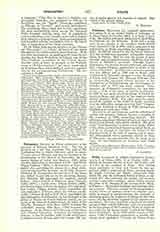

Politi, LANCELOT, in religion AMBROSIUS CATHARINUS, b. at Siena, 1483; d. at Naples, 1553. At sixteen he became Doctor of Civil and Canon Law (J.U.D.) in the academy of Siena. After visiting many academies in Italy and France he was appointed (1508) a professor at Siena, and had among his pupils Giovanni del Monte, afterwards Pope Julius III, and the celebrated Sixtus of Siena, a converted Jew who esteemed his master, yet severely criticized some of his writings. About 1513 he entered the Order of St. Dominic in the convent of St. Mark, at Florence. He studied Scripture and theology with-out a master. This may account for his independence, and his defense of opinions which were singular, especially in regard to predestination, the certitude of possessing grace, the residence of bishops in their dioceses, and the intention required in the minister of a sacrament. He was a strenuous defender of the Faith against Luther and his followers; and was prominent in the discussions of the Council of Trent, to which he was called by his former pupil, Cardinal del Monte, legate of Paul III. In the third public session (February 4, 1546), Catharinus pronounced a notable discourse, later published [” Oratio ad Patres Conc. Trid.” (Louvain, 1567; Paris, 1672)]. Notwithstanding attacks upon his teaching he was appointed Bishop of Minors in 1546, and, in 1552, Archbishop of Conza, Province of Naples. Pope Julius III, successor of Paul III, called Politi to Rome, intending, says Echard, to elevate him to the cardinalate, but he died before reaching Rome. Historians and theologians generally have regarded Catharinus as a brilliant, eccentric genius, who did much good, was frequently accused of teaching false doctrines, yet always kept within the bounds of orthodoxy. Pallavicini and other authorities declare positively that the Council of Trent did not condemn his singular opinions. His zeal and activity are universally praised; he defended the Immaculate Conception of the Blessed Virgin, and submitted all his writings to the judgment of the Church, regretting towards the end of his life the vehemence with which he had combatted Cardinal Cajetan and Father Dominic Soto (Echard). His principal works (for complete list see Echard) are: “Apologia pro veritate catholic ae et apostolic fidei ac doctrin, adversus impia ac pestifera Martini Lutheri dogmata” (Florence, 1520); “Speculum haereticorum” (Lyons, 1541), with two opuscula on original sin and justification; “Annotationes in commentaria Cajetani super sacram Scripturam” (Lyons, 1542); “Tractatus quaestionis quo lure episcoporum residentia debeatur’ (Venice, 1547); “Defensio catholicorum pro possibili certitudine gratiae” (ibid., 1547); “Summa doctrine de praedestinatione” (Rome, 1550); “Commentaria in omnes D. Pauli epistolas et alias septem canonicas” (Venice, 1551); “Disputatio pro veritate immaculatae conceptionis B. Virginis” (Rome, 1551). He also published numerous opuscula, e.g., on Providence and predestination, on the state of children dying without baptism; on giving communion to young children; on celibacy; on the Scriptures and their translation into the vernacular.
D. J. KENNEDY

